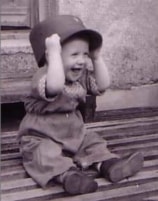
Died: Not yet, but I’ll get to it, just give me some time. So will you, for that matter. Not being morbid, but just look around. People tend to end up dead.
Skills: Physicist, writer, computer geek.
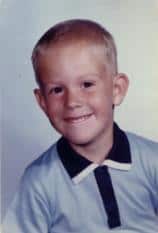

After that, I spent two wonderful and difficult years in Frankfurt, Germany before coming back to the states. I did all four years of high school at Monterey Bay Academy, in Watsonville, California. The school is right on the beach, but somehow we all got an education. Sort of.
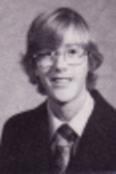
I’ve also won a bunch of awards for my novels. More on that in a bit.
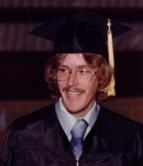
So of course, when I took the GRE exams, I did best in English. This makes no sense, but there you have it.
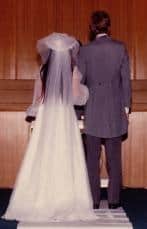
I also got married a couple of years into grad school, which I still think is the smartest thing I did there.
My thesis was titled “Accelerating the Loop Expansion,” which should be self-explanatory, but somehow isn’t. In simple terms, I showed how to reduce the Schwinger-Dyson equations for the effective action to a self-consistent expansion that you could integrate numerically. Obvious, no? Before I wrote my thesis, I also fiddled some with solitons and the gauged Wess-Zumino effective action.
Postdoctoral Work: I did a two-year stint at The Ohio State University, in Columbus, Ohio. I worked on superstring theory with Antti Niemi and Henrik Aratyn. We had a lot of fun with the Batalin-Fradkin-Vilkovisky formulation of constrained Hamiltonian systems. Impressed? I didn’t think so, but doggone it, you should be.
Sometime during grad school, I got it into my head that I could write a novel. Because, after all, I’m pretty good at reading novels. So writing one ought to be easy, yes? It’s kind of like how after you’ve been on an airplane a couple of hundred times, you start thinking you could fly a 747. In fact, it’s exactly like that.
Anyway, towards the end of my postdoc, I started writing the first of a long string of novels that never got published. These were not good, but each one was a little bit less bad than the previous one.
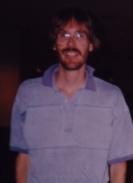
During all that time, I spent my spare time writing novels and going to writing conferences. I wish I could say that I found the magic trick that makes writing easy, but that would be a lie. The only trick to writing is to do a lot of it and then take it to a critique group to get hammered and then go read another book on how to write fiction. And then do that over and over again. I did that for years and years and years. If this somehow sounds like it was fun, then I haven’t explained things clearly.
Towards the end of the 90s, the economy began firming up, so I jumped ship to work for a couple of years at a higher salary at a startup software company, still doing computational physics.
It was right around then that I finally started getting published, after writing fiction for ten years. Suddenly, I found myself on the publishing treadmill, writing about one novel per year and selling it to a publisher and expecting them to market my book like crazy.
I thought this would make me wealthy in short order, but it turns out that most books don’t get marketed very well by their publishers and therefore most authors don’t get paid very well. I should be very bitter about this, but there is a bright side. I was able to spend many more hours per day working to enrich a wealthy corporation while I sharply reduced my average hourly wage.
Pretty cool, huh? Okay, to be truthful, I am kind of bitter about it.
But there is a real bright side here. Being a poorly paid author gives you an incentive to do well at your day job. I found that by switching jobs every couple of years, I could boost my salary enough that I could work part-time and still make a living. That did take some of the pressure off, but not entirely. My life has always felt like I was juggling chainsaws.
When one of my college roommates started a biotech company, he asked me to join his team. I didn’t know anything about biology, but I knew a lot about scientific computing and data analysis, so I joined him.
I’ve been doing that, with occasional upheavals, almost continuously ever since. In one of those upheavals, the company got bought by a large corporation that threw money at us for two years and then cancelled our project and our entire team was laid off. Which is not nearly as much fun as it sounds.
But my ex-roommate is a resourceful guy and he started a new company, Vala Sciences, and hired me back.
Right around then, my family and I sold our house in San Diego and moved up the coast to southern Washington and settled in there. The main reason was to be closer to my in-laws, who are old, and getting older.
I’ve continued working for Vala Sciences by telecommuting ever since. Vala is not making me rich, but I do enjoy analyzing microscope images and movies of biological systems and I’ve even learned a small amount of biology.
My Life as a Fiction Teacher: As soon as I published my first book, I got asked to teach a couple of classes at a local writing conference. I’m not a naturally talented teacher, but I did my duty to the state and taught the sessions. And again the next year. And the next.
It didn’t take long for other conferences to start inviting me. I don’t think I’ll win any awards for style, but apparently people like what I have to say. Within a few years, I was teaching at four to six conferences per year.
Which is a problem when you have panic disorder. At the time, I didn’t know I had panic disorder. I just knew that before every talk, I had a terrible panic attack. You’d think that would be kind of a dead giveaway, but it took me a while to figure it out.
Anyway, I eventually found a counsellor who helped me deal with the panic disorder, and it made a massive difference in my life. And it also fixed the panic attacks I was having before travel and before awards ceremonies.
One of my entrepreneurial friends thought I might do well by starting a business to teach people how to write fiction. She pestered me until I went insane and created a website for novelists.
I launched AdvancedFictionWriting.com in early 2005 and it’s done vastly better than I had any right to expect. The site has a wildly popular article on my “Snowflake Method” of writing a novel that has made me famous in the world of fiction writers, and has led to me publishing several how-to books.
But there are only so many things you can do in 24 hours. At a certain point, I had to take a break from writing fiction. I love fiction, but it wasn’t paying any bills, and it was costing me a lot of time. I had kids going to college, and my first duty is to my family. So I got off the publishing treadmill in 2005.
Several years later, the e-book revolution took off. Suddenly, anyone could publish a novel. You just write it, edit it, and post it on Amazon, Barnes & Noble, Apple, and Kobo, and they pay you for whatever you sell. Every month!
That’s kind of cool. No wait, that’s amazingly cool. I got the rights back from my publishers for all my novels and republished them myself. My novels aren’t making me rich, but they’re earning me more money now than they did when I was working with big corporate publishers. So I’m not so bitter anymore.
And that’s where I’m at today. Still working for Vala Sciences. Still running AdvancedFictionWriting.com. And I’m currently working on a gigantic project — a new four-book series of novels on the life, death, and resurrection of Jesus of Nazareth. The research for this project is a killer, but I’m having fun. I’ve read a ton of books, and once a year I go play archaeologist in Israel for several weeks.
And now a few words on my family…
Family: My wife Eunice has a masters degree in math and another masters degree in Slavic Languages and Literature. She’s obviously a glutton for punishment. Then she married me, so her life has been nothing but suffering.
On the plus side, we have three great kids.
Carolyn can read about three times faster than I can. She got a degree in English Lit and now works for a publisher as a copyeditor. She also does the proofreading for all my recent books.
Gracie is a math genius and is working on her PhD in math. When she was 13, she won the San Diego County Spelling Bee and earned a free trip to the National Spelling Bee in Washington D.C., where she tied for 16th place in a field of 251 kids.
Amy is amazingly talented on the violin, which she started studying right around her second birthday. She also is pretty good in Tae Kwan Do. She’s the practical one in our family and is currently working on her nursing degree.
We have had a variable number of cats over the years. Zephyr was the first, and he had a very long run. Along the way, we also had Rocky, Sammy, Midnight, Flash, and now lately, Diesel. Cats can be difficult sometimes. On the plus side, I’ve gotten a lot better at dealing with psychopaths.
Church: Yes, some physicists believe in God, and I’m one of them. I was raised in the Seventh-Day Adventist sect, which I would consider something of a mistake, if I had a choice in the matter. When I got old enough to have a choice in the matter, my wife and I decided to “pursue other theological options” and we left the SDA church.
Growing up SDA caused me a lot of cognitive dissonance. On the other hand, it taught me to ask hard questions about basic assumptions. This annoys some people, and I’m very sorry for that, but if you want my opinion, some of those people are kind of smug and deserve to be annoyed.
When we lived in San Diego, we spent a number of years in the Coast Vineyard in La Jolla, which is a church, not a winery. Back then, I also liked to hang out at Kehilat Ariel, a Messianic Jewish congregation, where I learned to read Hebrew. I enjoyed the music and the liturgy there, although I was never a member.
Beliefs: You may be wondering what the heck a working physicist believes in. Aren’t we all basically evil madmen with bad hair and glazed eyes? Well . . . yes. Is there a problem with that?
If you want to know what I think about the existence of God, the creation/evolution muddle, the possibility of miracles, yada, yada, I’ll say just this. I have opinions on some of these things. I don’t have opinions on others. I’m still trying to figure stuff out, and every few years I change my mind on something.
I think it’s more important to know what the questions are than to know the answers.
That’s very lucky, because I am now fairly clear on most of the questions. I am a lot less clear on the answers. If you wanted the answers, you should have asked me when I was 13 years old, because I knew absolutely everything back then. But now, not so much.
Writing Awards: I’ll keep this brief, mainly because I’m not so impressed with awards as I used to be. I’ve won a bunch of awards for my writing. Yay. Here are the highlights for my novels:
Transgression won a Christy award in “Futuristic Fiction.” The Christy awards are the Oscars of Christian fiction, so this meant something.
Oxygen won a Christy award in “Futuristic Fiction.” Oxygen also won a Silver Angel award and was named to the New York Public Library’s list Books for the Teen Age.
The Fifth Man was a finalist for a Christy award.
Premonition won a Book of the Year award from the American Christian Romance Writers in the “Long Historical Novel” category. ACRW eventually renamed itself ACFW (American Christian Fiction Writers) and renamed the award the Carol award.
Retribution was a finalist for a Christy award in the Historical Fiction category, and it also won a Book of the Year award from ACFW.
Double Vision also won an award, Best Mystery/Suspense Novel from the San Diego Book Awards Association.
That’s all for now. Only recycled electrons were used in this transmission. For you Star Wars fans, absolutely no Bothans died to obtain this information. Cheerio!